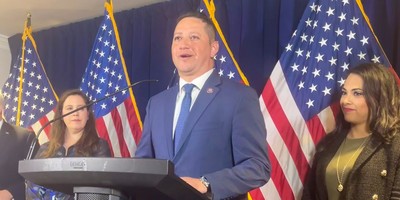We are witnessing unprecedented clashes and escalating political rhetoric between cash-starved state governments and their public service unions.
The conflict has yielded the worst notion yet among an array of increasingly painful potential solutions – declaring state bankruptcy, among other reasons, to escape the onerous bonds of contracts and accumulated promises made by multiple generations of politicians of both parties.
As a former Virginia governor, my advice is to consign that particular idea to the cutting room floor. In harsh reality, bankruptcy would likely cost taxpayers more over time than tax hikes or unaffordable public union contracts. And it would put the final financial decision-making in the hands of a federal judge whose persuasions and ultimate directives would be entirely unknown.
In the real world of government and finance, well-rated state and municipal bonds are a safe harbor for retirees, the elderly and small investors who are desperate today for as much certainty as they can find.
In 2010, investors seeking that certainty invested more that $84 billion in state and municipal bond mutual funds. The creation and development of mechanisms for states to go bankrupt, and ask a federal judge for permission to default, could prompt painful and costly credit rating downgrades that hurt all classes of investors, including working men and women holding 401 (k) plans that have already been beaten down.
By being trustworthy, creditworthy borrowers, responsible states and municipalities promote certainty for people who need it. They promote assurance for managers overseeing the nation’s retirement funds, pensions, mutual funds and money market funds on behalf of individuals.
The fact is it would cost any state an exorbitant amount of money in the long term to default on its investors through tactical bankruptcy engineered to escape union contracts or creditors. Even if anybody were willing to lend anything at all in the future, the required interest rates would be astronomical. Eventually, draconian spending cuts or dramatically higher taxes would likely be needed to pay that debt. Penalties on state governments fresh off a tactical bankruptcy and the citizens they serve would be severe.
Recommended
Some say we should simply keep on paying for unaffordable public union contracts and obligations to other creditors. That’s not viable. If gas prices continue to rise, burdens on mainstream wage earners would be magnified by tax increases. People of modest means, and even those in the middle class, would only be more pressured by a tax hike in a high-price energy environment. Our anemic economic recovery could very well turn into a double-dip recession with only deeper and more prolonged unemployment. In short, we don’t have the money.
There is only one viable path. And that is for political leaders who have now been elected across the country with the mandate to make tough choices to begin their hard work. Unfortunately, this will have to be done regardless of whether the public unions come to the negotiating table or a handful of legislators show up for a vote. Our country has promised too much, spent too much and borrowed too much. At any time, creditors could take these difficult decisions out of our hands and make those decisions even more painful for all.
So here’s some sound advice:
Public employee unions should lose the high-octane rhetoric. Put down the drums. Ditch the phony sick slips. Quickly let the sights and sounds of Madison, Wisconsin, recede from the public’s mind and consciousness. Approach negotiations in a serious, thoughtful spirit of shared sacrifice and a realistic, open-minded appraisal of the tough financial times faced by most taxpayers. Many will not be with you.
Political leaders, meanwhile, should be ready to work together in a bipartisan manner, make principled arguments and show up for the vote. Bipartisanship used to be a nice sound bite. In times like these, it will be our only way forward.
Government must make the same tough decisions that everyday Americans have had to make to work our way out of this terrible challenge. Even the toughest problems can be solved by leaders working in an honorable and trustworthy way that voters and the public can trust.

























Join the conversation as a VIP Member